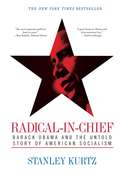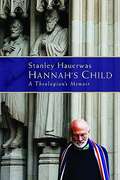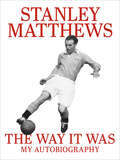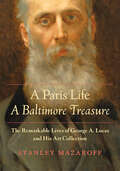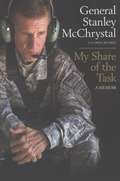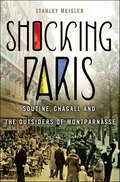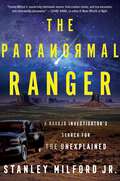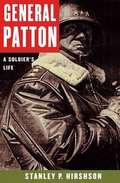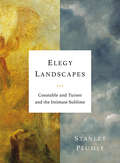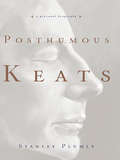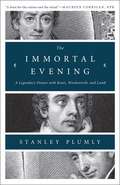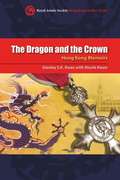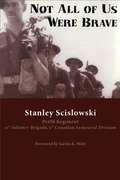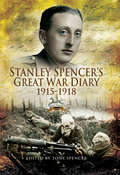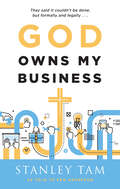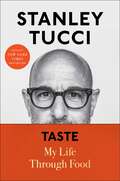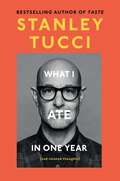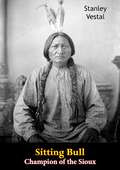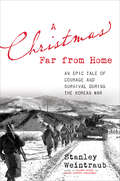- Table View
- List View
Radical-in-Chief: Barack Obama and the Untold Story of American Socialism
by Stanley KurtzPresident Barack Obama surprised many voters during a pre-election interview when he approvingly noted that Ronald Reagan had "changed the trajectory of America" in a way that other presidents had not. In effect, Obama was saying that he, too, aimed to transform America in some fundamental way. Yet while Americans in 1982 may have been divided over Reagan's politics, at least they knew what he stood for. Do we really understand Obama's vision for our country? In his controversial new book, veteran journalist Stanley Kurtz culls together two years of investigations from archives and never-before-tapped sources to present an exhaustively-researched exposÉ of President Obama's biggest secret--the socialist convictions and tactical ruthlessness he has long swept under the rug. A personable figure, a thoughtful politician, and an inspiring orator, Obama has hidden his core political beliefs from the American people--sometimes by directly misrepresenting his past and sometimes by omitting or parceling out damaging information to disguise its real importance. The president presents himself as a post-ideological pragmatist, yet his current policies grow directly from the nexus of socialist associates and theories that has shaped him throughout his adult life. Kurtz makes an in-depth exploration of the president's connections to radical groups such as ACORN, UNO of Chicago, the Midwest Academy, and the Socialist Scholars Conferences. He explains what modern "stealth" socialism is, how it has changed, and how it continues to influence the Democratic Party. He sheds light on what the New York Times called a "lost chapter" of the president's life--his years at Columbia--and proves that Obama's youthful infatuation with socialism was not just a phase. Those ideas have shaped his political views and set the groundwork for the long-term strategy of his administration. It could be argued that Obama's past no longer matters, but, in a sense, it matters more than the present. Obama has adopted the gradualist socialist strategy of his mentors, seeking to combine comprehensive government regulation of private businesses with a steadily enlarging public sector. Eventually, in his hands, capitalist America could resemble a socialist-inspired Scandinavian welfare state. The gap between inner conviction and public relations in Obama's case is vastly wider than for most American politicians. If Americans understood in 2008 the facts Kurtz reveals in this shocking political biography, Obama would not be president today. The fears of his harshest critics are justified: our Commander-in- Chief is a Radical-in-Chief.
Radical-in-Chief: Barack Obama and the Untold Story of American Socialism
by Stanley KurtzAn in-depth examination of President Barack Obama and his policies by journalist and political commentator Stanley Kurtz.
Hannah's Child: A Theologian's Memoir
by Stanley M. HauerwasA loving, hard-working, godly couple has long been denied a family of their own. Finally, the wife makes a deal with God: if he blesses her with a child, she will dedicate that child to God's service. The result of that prayer was the birth of an influential -- some say prophetic -- voice. Surprisingly, this is not the biblical story of Samuel but the account of Stanley Hauerwas, one of today's leading theologians in the church and the academy. The story of Hauerwas's journey into Christian discipleship is captivating and inspiring. With genuine humility, he describes his intellectual struggles with faith, how he has dealt with the complex reality of marriage to a mentally ill partner, and the gift of friendships that have influenced his character. Throughout the narrative shines Hauerwas's conviction that the tale of his life is worth telling only because of the greater Christian story providing foundation and direction for his own.
The Way It Was: My Autobiography
by Stanley MatthewsThe classic football memoir, now available as an ebook‘An absolute magical player. I loved him’ Sir Bobby Charlton‘A god to those of us who aspired to play the game’ Brian Clough‘The man who taught us the way football should be played’ PeléSir Stanley Matthews was the most popular footballer of his era and the game’s first global superstar. He was the first footballer to be knighted, the first European Footballer of the Year (aged 41), and he played in the top division until he was 50. His performance in the ‘Matthews final’ of 1953, when he inspired Blackpool to victory over Bolton, is widely considered the finest in FA Cup history.Here, in his own words, and showcasing his unique humour, is a sporting gentleman who epitomised a generation of legendary players: Sir Tom Finney, Nat Lofthouse, Billy Wright and many more. The Way It Was: My Autobiography is filled with characters, camaraderie, drama and insight, and is essential reading for anyone who wants to understand how football, and society, have changed over the last century. It is a fascinating memoir of a great footballer, and the remarkable story of an extraordinary life.Praise for The Way it Was‘A ticket to a different era, when the game wasn't saturated with money and men like Sir Stanley upheld sporting ideals’ The Times‘There is a heartfelt, elegiac quality [to] The Way It Was… it is only a pity he is not here to see it published’ Independent‘Brings vividly to life some of the greatest games of the time and features his perceptive analysis of the characters who illuminated the age’ Independent‘A gracefully crafted autobiography filled with entertaining anecdotes reflecting an age when the game was uncorrupted by greed’ Birmingham Post‘A fascinating and amusing insight into the inner workings of football during its golden era’ Daily Telegraph‘It is impossible to imagine any of today’s football stars ever producing a memoir half so interesting’ Mail on Sunday
A Paris Life, A Baltimore Treasure: The Remarkable Lives of George A. Lucas and His Art Collection
by Stanley MazaroffThe gripping biography of a man and his passion for art.In 1857, George A. Lucas, a young Baltimorean who was fluent in French and enamored of French art, arrived in Paris. There, he established an extensive personal network of celebrated artists and art dealers, becoming the quintessential French connection for American collectors. The most remarkable thing about Lucas was not the art that he acquired for his clients (who included William and Henry Walters, the founders of the Walters Art Museum, and John Taylor Johnston, the founding president of the Metropolitan Museum of Art) but the massive collection of 18,000 paintings, drawings, sculptures, and etchings, as well as 1,500 books, journals, and other sources about French artists, that he acquired for himself. Paintings by Cabanel, Corot, and Daubigny, prints by Whistler, Manet, and Cassatt, and portfolios of information about hundreds of French artists filled his apartment and spilled into the adjacent flat of his mistress.Based primarily on Lucas’s notes and diaries, as well as thousands of other archival documents, Stanley Mazaroff’s A Paris Life, A Baltimore Treasure tells the fascinating story of how Lucas brought together the most celebrated French artists with the most prominent and wealthy American collectors of the time. It also details how, nearing the end of his life, Lucas struggled to find a future home for his collection, eventually giving it to Baltimore’s Maryland Institute. Without the means to care for the collection, the Institute loaned it to the Baltimore Museum of Art, where most of the art was placed in storage and disappeared from public view. But in 1990, when the Institute proposed to auction or otherwise sell the collection, it rose from obscurity, reached new glory as an irreplaceable cultural treasure, and became the subject of an epic battle fought in and out of court that captivated public attention and enflamed the passions of art lovers and museum officials across the nation.A Paris Life, A Baltimore Treasure is a richly illustrated portrayal of Lucas's fascinating life as an agent, connoisseur, and collector of French mid-nineteenth-century art. And, as revealed in the book, following Lucas's death, his enormous collection continued to have a vibrant life of its own, presenting new challenges to museum officials in studying, conserving, displaying, and ultimately saving the collection as an important and intrinsic part of the culture of our time.
A Paris Life, A Baltimore Treasure: The Remarkable Lives of George A. Lucas and His Art Collection
by Stanley Mazaroff“[An] elegantly written account of all facets of the life and career of George A. Lucas . . . of Belle Époque Paris and Gilded Age America.” —Inge Reist, Director Emeritus of The Frick Collection’s Center for the History of CollectingIn 1857, young Baltimorean George A. Lucas arrived in Paris, where he established an extensive personal network of celebrated artists and art dealers, becoming the quintessential French connection for American collectors. The most remarkable thing about Lucas was not the art that he acquired for his clients but the massive collection of 18,000 paintings, drawings, sculptures, and etchings, as well as 1,500 books, journals, and other sources about French artists, that he acquired for himself. Paintings by Cabanel, Corot, and Daubigny, prints by Whistler, Manet, and Cassatt, and portfolios of information about hundreds of French artists filled his apartment and spilled into the adjacent flat of his mistress.Based primarily on Lucas’s notes and diaries, as well as thousands of other archival documents, A Paris Life, A Baltimore Treasure is a richly illustrated portrayal of Lucas’s fascinating life as an agent, connoisseur, and collector of French mid-nineteenth-century art. And, as revealed in the book, following Lucas’s death, his enormous collection continued to have a vibrant life of its own, when—in 1990—Baltimore’s Maryland Institute proposed to auction or otherwise sell the collection. It rose from obscurity, reached new glory as an irreplaceable cultural treasure, and became the subject of an epic battle fought in and out of court that captivated public attention and enflamed the passions of art lovers and museum officials across the nation.“Mazaroff has thoughtfully recreated the legacy of one of America’s best documented late-nineteenth-century French art collections.” —Doreen Bolger, Director Emeritus, The Baltimore Museum of Art
My Share of the Task: A Memoir
by Stanley Mcchrystal"Never shall I fail my comrades. ... I will shoulder more than my share of the task, whatever it may be, one hundred percent and then some." --from the Ranger Creed. In early March 2010, General Stanley McChrystal, the commanding officer of all U.S. and coalition forces in Afghanistan, walked with President Hamid Karzai through a small rural bazaar. As Afghan townspeople crowded around them, a Taliban rocket loudly thudded into the ground some distance away. Karzai looked to McChrystal, who shrugged. The two leaders continued greeting the townspeople and listening to their views. That trip was typical of McChrystal's entire career, from his first day as a West Point plebe to his last day as a four-star general. The values he has come to be widely admired for were evident: a hunger to know the truth on the ground, the courage to find it, and the humility to listen to those around him. Even as a senior commander, McChrystal stationed himself forward, and frequently went on patrols with his troops to experience their challenges firsthand. In this illuminating memoir, McChrystal frankly explores the major episodes and controversies of his eventful career. He delves candidly into the intersection of history, leadership, and his own experience to produce a book of enduring value. Joining the troubled post-Vietnam army as a young officer, McChrystal witnessed and participated in some of our military's most difficult struggles. He describes the many outstanding leaders he served with and the handful of bad leaders he learned not to emulate. He paints a vivid portrait of the traditional military establishment that turned itself, in one generation, into the adaptive, resilient force that would soon be tested in Iraq, Afghanistan, and the wider War on Terror. McChrystal spent much of his early career in the world of special operations, at a time when these elite forces became increasingly effective--and necessary. He writes of a fight waged in the shadows by the Joint Special Operations Command (JSOC), which he led from 2003 to 2008. JSOC became one of our most effective counterterrorism weapons, facing off against Al Qaeda in Iraq. Over time, JSOC gathered staggering amounts of intelligence in order to find and remove the most influential and dangerous terrorists, including the leader of Al Qaeda in Iraq, Abu Musab al-Zarqawi. The hunt for Zarqawi drives some of the most gripping scenes in this book, as McChrystal's team grappled with tricky interrogations, advanced but scarce technology, weeks of unbroken surveillance, and agonizing decisions. McChrystal brought the same energy to the war in Afghanistan, where the challenges loomed even larger. His revealing account draws on his close relationships with Afghan leaders, giving readers a unique window into the war and the country. Ultimately, My Share of the Task is about much more than war and peace, terrorism and counterinsurgency. As McChrystal writes, "More by luck than design, I'd been a part of some events, organizations, and efforts that will loom large in history, and more that will not. I saw selfless commitment, petty politics, unspeakable cruelty, and quiet courage in places and quantities that I'd never have imagined. But what I will remember most are the leaders."
Shocking Paris: Soutine, Chagall and the Outsiders of Montparnasse
by Stanley MeislerFor a couple of decades before World War II, a group of immigrant painters and sculptors, including Amedeo Modigliani, Marc Chagall, Chaim Soutine and Jules Pascin dominated the new art scene of Montparnasse in Paris. Art critics gave them the name "the School of Paris" to set them apart from the French-born (and less talented) young artists of the period. Modigliani and Chagall eventually attained enormous worldwide popularity, but in those earlier days most School of Paris painters looked on Soutine as their most talented contemporary. Willem de Kooning proclaimed Soutine his favorite painter, and Jackson Pollack hailed him as a major influence. Soutine arrived in Paris while many painters were experimenting with cubism, but he had no time for trends and fashions; like his art, Soutine was intense, demonic, and fierce. After the defeat of France by Hitler's Germany, the East European Jewish immigrants who had made their way to France for sanctuary were no longer safe. In constant fear of the French police and the German Gestapo, plagued by poor health and bouts of depression, Soutine was the epitome of the tortured artist. Rich in period detail, Stanley Meisler's Shocking Paris explores the short, dramatic life of one of the most influential artists of the twentieth century.
The Paranormal Ranger: A Navajo Investigator's Search for the Unexplained
by Stanley Milford, Jr.*A NEW YORK TIMES PICK FOR TOP 22 NONFICTION BOOKS TO READ THIS FALL!*A Navajo Ranger’s chilling and clear-eyed memoir of his investigations into bizarre cases of the paranormal and unexplained in NavajolandAs a Native American with parents of both Navajo and Cherokee descent, Stanley Milford Jr. grew up in a world where the supernatural was both expected and taboo, where shapeshifters roamed, witchcraft was a thing to be feared, and children were taught not to whistle at night. In his youth, Milford never went looking for the paranormal, but it always seemed to find him. When he joined the fabled Navajo Rangers—a law enforcement branch of the Navajo Nation who are equal parts police officers, archeological conservationists, and historians—the paranormal became part of his job. Alongside addressing the mundane duties of overseeing the massive 27,000-square-mile reservation, Milford was assigned to utterly bizarre and shockingly frequent cases involving mysterious livestock mutilations, skinwalker and Bigfoot sightings, UFOs, and malicious hauntings.In The Paranormal Ranger, Milford recounts the stories of these cases from the clinical and deductive perspective of a law enforcement officer. Milford’s Native American worldview and investigative training collide to provide an eerie account of what logic dictates should not be possible.
General Patton: A Soldier's Life
by Stanley P. Hirshson"War is my work and I know I sound sometimes as though I liked it; perhaps I do -- how can I tell? -- but this war hurts everybody. " -- Patton to Henry J. Taylor, 1945. General George S. Patton, Jr. , an inspirational leader and outstanding tactician, has intrigued and confounded his biographers. Now, utilizing untapped archival materials in both the United States and England, government documents, family papers, and oral histories, Stanley P. Hirshson creates the most balanced portrait of Patton ever written. It reveals Patton as a complex soldier capable of brilliant military maneuvers but also of inspiring his troops with fiery speeches that resulted in horrendous acts, such as the massacres of Italian civilians, It explains Patton's belief in a soldiers Valhalla, connects the family's wealth to one of Americas bitterest labor strikes, and disputes the usual interpretation of Patton's relief from command of the Third Army. In investigating this complex man, Hirshson has uncovered surprising material about a series of civilian massacres in Sicily, about the two slapping incidents, about attempts to exploit Patton's diary after his death, and about Patton's relations with top Allied generals. Patton emerges as a soldier of great imagination and courage, and his military campaigns make for edge-of-the-seat reading. All the drama of Patton's life comes alive in this meticulously documented volume.
African-American Aviators
by Stanley P. JonesBriefly describes the lives and accomplishments of five African-American pilots: James Banning, Bessie Coleman, Daniel James, Benjamin Davis, and William Powell.
Elegy Landscapes: Constable And Turner And The Intimate Sublime
by Stanley PlumlyA sweeping look at the lives and work of two important English Romantic painters, from a Los Angeles Times Book Prize–winning author. Renowned poet Stanley Plumly, who has been praised for his “obsessive, intricate, intimate and brilliant” (Washington Post) nonfiction, explores immortality in art through the work of two impressive landscape artists: John Constable and J.M.W. Turner. How is it that this disparate pair will come to be regarded as Britain’s supreme landscape painters, precursors to Impressionism and Modernism? How did each painter’s life influence his work? Almost exact contemporaries, both legendary artists experience a life-changing tragedy—for Constable it is the long illness and death of his wife; for Turner, the death of his singular parent and supporter, his father. Their work will take on new power thereafter: Constable, his Hampstead cloud studies; Turner, his Venetian watercolors and oils. Seeking the transcendent aesthetic awe of the sublime and reeling from their personal anguish, these talented painters portrayed the terrible beauty of the natural world from an intimate, close-up perspective. Plumly studies the paintings against the pull of the artists’ lives, probing how each finds the sublime in different, though inherently connected, worlds. At once a meditation on the difficulties in achieving truly immortal works of art and an exploration of the relationship between artist and artwork, Elegy Landscapes takes a wide-angle look at the philosophy of the sublime.
Posthumous Keats: A Personal Biography
by Stanley PlumlyAn acclaimed American poet reflects on the life and legacy of John Keats. Posthumous Keats is the result of Stanley Plumly's twenty years of reflection on the enduring afterlife of one of England's greatest Romanticists. John Keats's famous epitaph--"Here lies One Whose Name was writ in Water"--helped cement his reputation as the archetype of the genius cut off before his time. Keats, dead of tuberculosis at twenty-five, saw his mortality as fatal to his poetry, and therein, Plumly argues, lies his tragedy: Keats thought he had failed in his mission "to be among the English poets."In this close narrative study, Plumly meditates on the chances for poetic immortality--an idea that finds its purest expression in Keats, whose poetic influence remains immense. Incisive in its observations and beautifully written, Posthumous Keats is an ode to an unsuspecting young poet--a man who, against the odds of his culture and critics, managed to achieve the unthinkable: the elevation of the lyric poem to sublime and tragic status.
The Immortal Evening: A Legendary Dinner with Keats, Wordsworth, and Lamb
by Stanley PlumlyA window onto the lives of the Romantic poets through the re-creation of one legendary night in 1817. The author of the highly acclaimed Posthumous Keats, praised as "full of . . . those fleeting moments we call genius" (Washington Post), now provides a window into the lives of Keats and his contemporaries in this brilliant new work. On December 28, 1817, the painter Benjamin Robert Haydon hosted what he referred to in his diaries and autobiography as the "immortal dinner." He wanted to introduce his young friend John Keats to the great William Wordsworth and to celebrate with his friends his most important historical painting thus far, "Christ's Entry into Jerusalem," in which Keats, Wordsworth, and Charles Lamb (also a guest at the party) appeared. After thoughtful and entertaining discussions of poetry and art and their relation to Enlightenment science, the party evolved into a lively, raucous evening. This legendary event would prove to be a highlight in the lives of these immortals. A beautiful and profound work of extraordinary brilliance, The Immortal Evening regards the dinner as a lens through which to understand the lives and work of these legendary artists and to contemplate the immortality of genius.
The Dragon and the Crown: Hong Kong Memoirs
by Stanley S. K. KwanWhile Hong Kong's spectacular economic growth and political development have been well documented, the social and cultural lives of the ordinary people swept up in the changes have not found a significant voice. Through the personal experiences of Stanley Kwan and those around him, this book gives such a voice to people whose lives have been profoundly affected by the dramatic changes, as Hong Kong transitioned to an international financial centre, and from a colony to become a part of China. Wedged between the East and the West - the Dragon and the Crown - Stanley Kwan's life experiences reflect the forces pulling at Hong Kong. He was born into a traditional Chinese banking family but attended King's College under the British colonial system. Fired up by patriotism during the war, he joined the Nationalist Chinese army and served as an interpreter for American forces in southwest China. In 1949, two of his brothers went to the Mainland to join the socialist revolution. Although tempted to join, he stayed in Hong Kong, worked for a British firm and became a China watcher at the American Consulate General. He finally joined a local Chinese bank - Hang Seng Bank where, as head of the Research Department, he launched the Hang Seng Index and witnessed the dramatic cycles of the Hong Kong economy. With the prospect of 1997, Stanley Kwan deliberated on his future and decided to retire to Canada in 1984, joining the tide of immigrants from Hong Kong. The book contributes to the ongoing search for Hong Kong identity in the Special Administrative Region and will resonate among people in Hong Kong as well as those interested in the fate of the former colony.
Not All of Us Were Brave
by Stanley ScislowskiThis is the story of a young man’s journey through World War II. It covers a wide cross section of the strengths and weaknesses of young men not attuned to killing, and not mentally prepared to face the horror of seeing their close friends die violent deaths in battle. The story is about the hopes, the prayers, the fears, the daily miseries and even the lighter moments that the aspiring heroes of the Perth Regiment experienced on the Italian front as part of 11th Infantry Brigade, 5th Canadian Armoured Division.As the title suggests, from his first battle inoculation Private Stan Scislowski realizes he is not destined for the heroic role to which he once aspired. His fears affect him deeply: his burning dream of returning home a national hero becomes more and more improbable, and his attempts to come to terms with his un-heroic nature make the war as much a mental battle as a physical one. His story is much like that of the overwhelming number of Canadians who found themselves in the cauldron of war, serving their country with all the strength they could find, even when that strength was fading fast.Not All of Us Were Brave focuses not on the heroes, but on the ordinary soldiers who endured the mud, the misery, the ever-present fear, the inspiration, and the degradation. The narrative holds nothing back: the dirty linen is aired along with the clean; the light is shown alongside the dark. It shows what war is all about.
Stanley Spencer's Great War Diary, 1915–1918
by Stanley SpencerStanley Spencer enlisted with the Royal Fusiliers as a private in 1915 and was commissioned in 1917 and thereafter served with the West Yorkshire Regiment until demobilised in 1919. He saw almost continuous active service from 1915 to the end of the War.
God Owns My Business: They Said It Couldn't Be Done, But Formally and Legally...
by Stanley TamGod Owns My Business is more than a book about a successful businessman. It is the chronicle of how an average man can, with God's guidance and a willing heart, succeed in any endeavor. They said it couldn&’t be done, but formally and legally, business owner Stanley Tam made God the owner of his business. To say that his business has met with success thanks to this decision would be a significant understatement—Stanley Tam's businesses are large and profitable, giving well over a million dollars annually. Learn what happens when a man gives his business—literally—to God, and be inspired to steward your whole life for God's honor.
God Owns My Business: They Said It Couldn't Be Done, But Formally and Legally...
by Stanley TamGod Owns My Business is more than a book about a successful businessman. It is the chronicle of how an average man can, with God's guidance and a willing heart, succeed in any endeavor. They said it couldn&’t be done, but formally and legally, business owner Stanley Tam made God the owner of his business. To say that his business has met with success thanks to this decision would be a significant understatement—Stanley Tam's businesses are large and profitable, giving well over a million dollars annually. Learn what happens when a man gives his business—literally—to God, and be inspired to steward your whole life for God's honor.
Taste: My Life Through Food
by Stanley TucciINSTANT NEW YORK TIMES BESTSELLER Named a Notable Book of 2021 by NPR and The Washington Post From award-winning actor and food obsessive Stanley Tucci comes an intimate and charming memoir of life in and out of the kitchen.Stanley Tucci grew up in an Italian American family that spent every night around the kitchen table. He shared the magic of those meals with us in The Tucci Cookbook and The Tucci Table, and now he takes us beyond the savory recipes and into the compelling stories behind them. Taste is a reflection on the intersection of food and life, filled with anecdotes about his growing up in Westchester, New York; preparing for and shooting the foodie films Big Night and Julie & Julia; falling in love over dinner; and teaming up with his wife to create meals for a multitude of children. Each morsel of this gastronomic journey through good times and bad, five-star meals and burned dishes, is as heartfelt and delicious as the last. Written with Stanley&’s signature wry humor, Taste is for fans of Bill Buford, Gabrielle Hamilton, and Ruth Reichl—and anyone who knows the power of a home-cooked meal.
What I Ate in One Year: (and related thoughts)
by Stanley TucciFrom Stanley Tucci, award-winning actor and New York Times bestselling author, a deliciously unique memoir chronicling a year’s worth of meals. “Sharing food is one of the purest human acts.” Food has always been an integral part of Stanley Tucci’s life: from stracciatella soup served in the shadow of the Pantheon, to marinara sauce cooked between scene rehearsals and costume fittings, to home-made pizza eaten with his children before bedtime. Now, in What I Ate in One Year Tucci records twelve months of eating—in restaurants, kitchens, film sets, press junkets, at home and abroad, with friends, with family, with strangers, and occasionally just by himself. Ranging from the mouth-wateringly memorable to the comfortingly domestic and to the infuriatingly inedible, the meals memorialised in this diary are a prism for him to reflect on the ways his life, and his family, are constantly evolving. Through food he marks—and mourns—the passing of time, the loss of loved ones, and steels himself for what is to come. Whether it’s duck a l’orange eaten with fellow actors and cooked by singing Carmelite nuns, steaks barbequed at a gathering with friends, or meatballs made by his mother and son and shared at the table with three generations of his family, these meals give shape and add emotional richness to his days. What I Ate in One Year is a funny, poignant, heartfelt, and deeply satisfying serving of memories and meals and an irresistible celebration of the profound role that food plays in all our lives. <br><b>New York Times Bestseller</b></br>
Sitting Bull Champion of the Sioux
by Stanley Vestal"If that is Long Hair, I am the one who killed him," White Bull, the young nephew of Sitting Bull, said when Bad Juice pointed out Custer's body immediately after the Battle of the Little Big Horn. Yet it was Sitting Bull who acquired the notoriety and was paraded in Buffalo Bill's Wild West Show as "the warrior who killed Custer." But this new edition of Stanley Vestal's classic biography of the famous chief emphasizes that "Sitting Bull's fame does not rest upon the death of Custer’s five troops. Had he been twenty miles away shooting antelope that morning, he would still remain the greatest of the Sioux."The stirring account of the death throes of a mighty nation and its leader is the story of the "greatest of the Sioux" and his struggle to keep his people free and united. The Sioux were formidable warriors, as attested to by men who fought against them, like General Anson Mills, who said, "They were the best cavalry in the world; their like will never be seen again," but they were up against an overwhelming tide of soldiers, homesteaders, and bureaucrats. Sitting Bull fought long and hard and "He was ... a statesman, one of the most farsighted we have had," but statesmanship could not prevail against such odds.-Print ed.
A Christmas Far from Home: An Epic Tale of Courage and Survival during the Korean War
by Stanley WeintraubAn anecdote-rich narrative of the 1950 holiday season during the Korean War, when, just after Thanksgiving, tens of thousands of US troops were surrounded in the Chosin reservoir area by hundreds of thousands of Chinese troops and began a terrible and difficult retreat, which finally ended on Christmas Day.
Edward the Caresser: The Playboy Prince Who Became Edward VII
by Stanley WeintraubA weak English King at a critical time.
